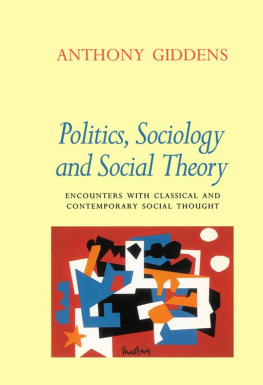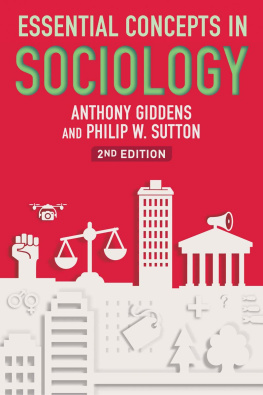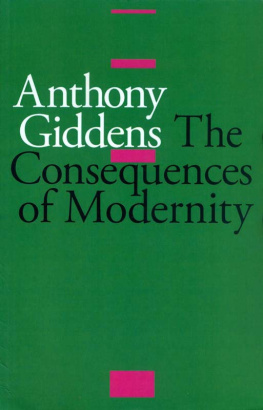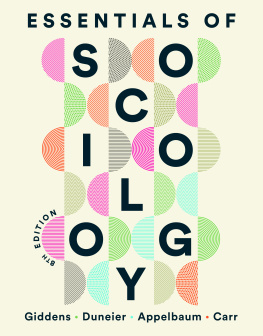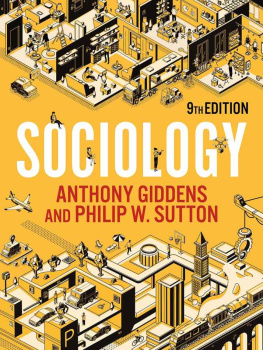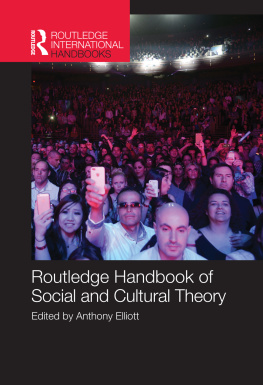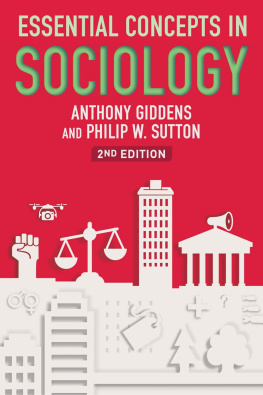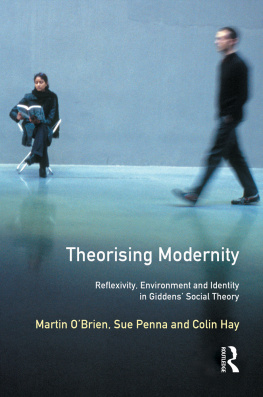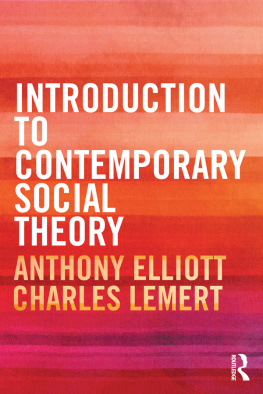Anthony Giddens - Politics, Sociology and Social Theory
Here you can read online Anthony Giddens - Politics, Sociology and Social Theory full text of the book (entire story) in english for free. Download pdf and epub, get meaning, cover and reviews about this ebook. year: 2013, publisher: Polity Press, genre: Politics. Description of the work, (preface) as well as reviews are available. Best literature library LitArk.com created for fans of good reading and offers a wide selection of genres:
Romance novel
Science fiction
Adventure
Detective
Science
History
Home and family
Prose
Art
Politics
Computer
Non-fiction
Religion
Business
Children
Humor
Choose a favorite category and find really read worthwhile books. Enjoy immersion in the world of imagination, feel the emotions of the characters or learn something new for yourself, make an fascinating discovery.
- Book:Politics, Sociology and Social Theory
- Author:
- Publisher:Polity Press
- Genre:
- Year:2013
- Rating:5 / 5
- Favourites:Add to favourites
- Your mark:
- 100
- 1
- 2
- 3
- 4
- 5
Politics, Sociology and Social Theory: summary, description and annotation
We offer to read an annotation, description, summary or preface (depends on what the author of the book "Politics, Sociology and Social Theory" wrote himself). If you haven't found the necessary information about the book — write in the comments, we will try to find it.
Politics, Sociology and Social Theory — read online for free the complete book (whole text) full work
Below is the text of the book, divided by pages. System saving the place of the last page read, allows you to conveniently read the book "Politics, Sociology and Social Theory" online for free, without having to search again every time where you left off. Put a bookmark, and you can go to the page where you finished reading at any time.
Font size:
Interval:
Bookmark:
Anthony Giddens
Polity Press
Copyright Anthony Giddens 1995
The right of Anthony Giddens to be identified as author of this work has been asserted in accordance with the Copyright, Designs and Patents Act 1988.
First published in 1995 by Polity Press
in association with Blackwell Publishers Ltd.
Reprinted 2004
Editorial office:
Polity Press
65 Bridge Street
Cambridge CB2 1UR, UK
Marketing and production:
Blackwell Publishers Ltd
108 Cowley Road
Oxford OX4 1JF, UK
All rights reserved. Except for the quotation of short passages for the purposes of criticism and review, no part of this publication may be reproduced, stored in a retrieval system, or transmitted, in any form or by any means, electronic, mechanical, photocopying, recording or otherwise, without the prior permission of the publisher.
Except in the United States of America, this book is sold subject to the condition that it shall not, by way of trade or otherwise, be lent, re-sold, hired out, or otherwise circulated without the publishers prior consent in any form of binding or cover other than that in which it is published and without a similar condition including this condition being imposed on the subsequent purchaser.
ISBN 0 7456 15392
ISBN 0 7456 15406 (pbk)
ISBN 978-0-7456-6656-3 (eBook)
A CIP catalogue record for this book is available from the British Library.
Typeset in 11 on 121/2 pt Times
by Best-set Typesetter Ltd, Hong Kong
Printed and bound in Great Britain by
Marston Book Services Limited, Oxford
This book is printed on acid free
Contents
Preface
The articles which compose this book have been drawn from several sources. The first article in the collection, Politics and Sociology in the Thought of Max Weber, was originally published as a separate booklet. The remainder of the selections come from two further sources: Studies in Social and Political Theory, originally published by Hutchinson, and Profiles and Critiques in Social Theory, published first of all by Macmillan. In choosing papers from these two books, I have been guided mainly by the criterion of contemporary relevance. I hope that the reader might agree that the articles reprinted here retain their interest today. I have made minor alterations to some of the articles included herein and have cut down on surplus notes. However, most of the substance of the articles remains unchanged.
I am grateful to various people who have helped me in preparing this book for publication. Thanks in particular to Katy Giddens, Don Hubert and Nicola Ross.
Introduction
This book offers a series of integrated reflections upon a set of topics in classical social theory and more recent schools of thought. At the time at which the first several articles in this volume were first written, the state of thinking about the sociological classics was rather different from what it is now. Two decades ago the classics were not what they have since become. At that time, sociology in the English-speaking world was dominated by American perspectives, particularly in respect of theoretical work. The agenda was set by Talcott Parsonss The Structure of Social Action, which first appeared in 1937 but did not achieve a substantial influence until considerably later in the post-war period. Parsons it was who sought to establish what would later be called a paradigm in sociology and who drew up the writings of European thinkers of the nineteenth and early twentieth centuries to do so. Parsonss work from the beginning was vociferously criticized and continues to be the subject of critical debate down to this day.
Whatever the merits or otherwise of Parsonss path-breaking book, it was one of the main influences bringing into common currency the idea that there was a distinctive generation of thinkers who in some sense established sociology, and to a degree the other social sciences too, as viable enterprises. That generation, the 18901920 generation, according to Parsons, had broken in a definitive way with the more speculative forms of social interpretation which preceded them; and that generation had done most of the ground-clearing for the later emergence of a properly founded theoretical framework for social science.
Of course, Parsons was not alone in suggesting these ideas, but his influence was none the less quite profound. Parsons helped initiate the idea that there were distinctive founding fathers in sociology a notion to which Parsonss student and intellectual colleague R.K. Merton gave further flesh. Parsonss The Structure of Social Action was important in another way too. For it was Parsons, more than any other author, who introduced Max Weber to an Anglo-Saxon audience as one of the principal founders of sociology. Parsons translated The Protestant Ethic and the Spirit of Capitalism, he produced the first English translation of segments of Economy and Society, and he propelled into public view the sociological aspects of Webers work.
Parsonss interpretation of Weber was idiosyncratic, because Parsons wished above all to make use of Weber to develop his own doctrines. Yet whatever objections others might have made to Parsonss Weber, there is no doubt that Parsons was the main scholar who early on helped make Weber a figure of such extraordinary stature in English-speaking sociology. This might have happened anyway, but before Parsons came along Weber was thought of by Anglo-Saxon authors mainly as an economic historian and theorist of jurisprudence. This was the way, for example, that Weber had been interpreted by R.H. Tawney and again by Frank Knight, the translator of the texts which appeared in English under the title of General Economic History.
Parsons did not have as much influence over the reception of Durkheim in the English-speaking world. Several of Durkheims works had become accessible before those of Weber; and Durkheim was a self-professed advocate of sociology, whose thought had from the beginning had some impact upon both sociology and anthropology in Britain and the United States. Nevertheless, apart from its reception in anthropology particularly in the writings of Radcliffe-Brown Durkheims thought was only poorly understood among Anglo-American sociological authors. Many thought of Durkheim as a theorist of a metaphysical collective consciousness someone who thought the collective always superior to the individual. Parsonss work on Durkheim had many shortcomings, but it did serve to elevate the critical analysis of Durkheims works to a new plane of sophistication.
When I wrote my own book, Capitalism and Modern Social Theory (1971), and some of the later pieces included in this collection, Parsonss influence was at its height. Few people at that time, though, curiously, thought in terms of the triad of classics which later became such a central part of the received wisdom in undergraduate courses in sociology. The Structure of Social Action included only a few brief pages on Marx, whom Parsons regarded as a utilitarian forerunner of the 18901920 generation.
There were many authors who sought to use Marx to counteract what they saw as certain one-sided tendencies in Parsonss thought Ralf Dahrendorf, John Rex, David Lockwood, among others. Most Marxists, however, had little truck with either Weber or Durkheim, and saw the development of sociological thought mainly in terms of a line of continuity from Marx and Engels through to the various schools of Marxism which developed over the following century or so.
Even as late as the 1960s, the idea that there were distinctive founding fathers of sociology, and that they were to be found specifically in Europe, had barely taken hold. British sociology up to that period tended to be strongly empirical dominated by Fabianism and an orientation towards questions of social welfare. The writings of T.H. Marshall represented perhaps the leading example. Theoretical thinking in sociology was overshadowed by anthropological thought. Sociology had no one to compare with the dazzling group of anthropological authors which, besides Radcliffe-Brown, included Bronislaw Malinowski, E.E. Evans-Pritchard, Edmond Leach, Raymond Firth, Meyer Fortes, Audrey Richards and many others. With the exception of one or two migr authors, such as Karl Mannheim whose work was in any case slightly earlier indigenous social theorists were not in the same league. They looked mainly to previous British thinkers, such as Spencer or Hobhouse, rather than to continental thought for their inspiration: the work of Morris Ginsburg is an example.
Font size:
Interval:
Bookmark:
Similar books «Politics, Sociology and Social Theory»
Look at similar books to Politics, Sociology and Social Theory. We have selected literature similar in name and meaning in the hope of providing readers with more options to find new, interesting, not yet read works.
Discussion, reviews of the book Politics, Sociology and Social Theory and just readers' own opinions. Leave your comments, write what you think about the work, its meaning or the main characters. Specify what exactly you liked and what you didn't like, and why you think so.

